Even now I’m not sure how to pronounce it. “Do you go to Breightmet?” I quickly ask the driver, so he can’t tell whether I’m saying it right.
“£1.50,” he replies.
By the time my map app has realised we’re now in Bolton, the blue dot has travelled further up the Bury Road than I had intended. I’m going to have a long walk through Breightmet to the UCAN Centre. And it’s started to rain. I discover later that the 562 would have dropped me right outside, but at least this way I get to see some of the place I’ll be writing about for the next 12 months.
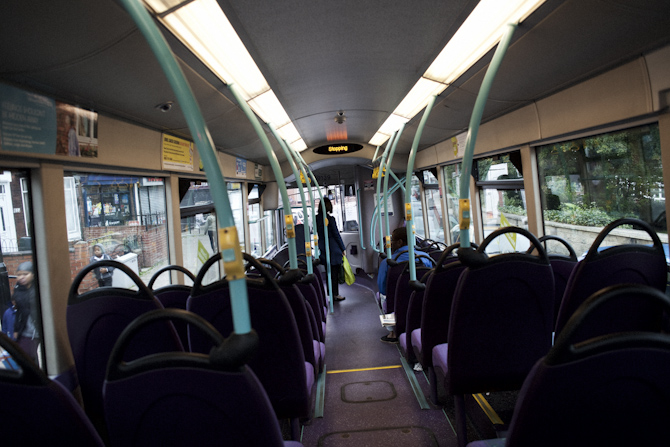
As housing estates go, I’ve seen much worse. Maybe this is the posh end. Here are rows of tidy family houses with spacious front gardens, mostly well looked after. And here’s a Bolton at Home maintenance van parked up outside one of the semis, toolboxes by the open front door and banging noises coming from inside. It could almost have been planned to give me a good first impression.
I struggle to work out which houses are owner-occupied – ex-council houses bought by their long-term tenants – and which are part of the 3,900 managed by the housing association. Usually the social houses are easy to spot: identical front doors and less well-maintained. But here they’re neck and neck.
I know better than to assume the whole estate is like this or that everything up these garden paths is as it should be. From one of the meetings to discuss this blog project I’ve been told Breightmet has more than its fair share of challenges.
“It’s definitely a different sort of community,” the UCAN’s manager, Vanessa, had told me. “When properties become available for rent they’ll be filled by people who already live here. People don’t generally move to Breightmet.
“And historically it has a reputation for poor schooling and poor health, although that’s now being addressed with a new academy, new health centre and new library. Oh, and anti-social behaviour, although that’s supposed to be improving too.”
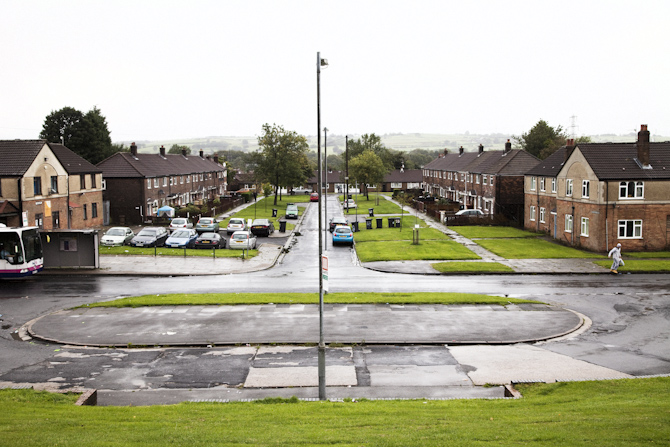
By the time I reach New Lane it’s clear this is a diverse estate. That definitely was the posh end. Now the occasional hanging basket and clipped privet hedge compete with the stereotypical, burnt-out wheelie bin and rotten picket fence. To take my mind off the drizzle I try to visualise the occupants of each house I pass, and imagine the stories they might tell.
I sit in a bus shelter and look across at the unremarkable UCAN Centre opposite. It’s in the middle of a short row of shops that includes a small supermarket, a chippy and a post office that was surely overlooked in the latest round of closures.
According to those who set it up, this advice centre gives the residents of Breightmet a level of support that’s ‘as rare as rubies’ in the public sector. They have apparently fine tuned their services to exactly what their customers need and they deliver them with genuine care and concern for each individual.
Dodging the Holland’s Pies van that has just delivered to the chippy, I cross the road and start my first day.
It’s barely 9.30 and already three of the eight computers in the front room are occupied. This morning it’s a drop-in. Sign in and you can sit in front of one of the PCs, upload a CV, check email or keep up on Facebook.
“It’s usually busier than this,” says Carl as he points out the tea bags in the tidy kitchen. “The kids aren’t back at school yet so there won’t be so many in today. Yes, just help yourself to any of that milk.”
After a quick orientation – downstairs there are only a couple of small offices as well as the computer room, kitchen and toilet – I spend the morning talking first to Carl and then Rosanne, the UCAN’s front line staff. It takes a certain type of person to do this work and I’m intrigued to hear what motivates them.
“There is no greater job satisfaction than being able to help people with their problems,” says Carl. “This job is all about building trust. We take the time to build relationships and then we can really help. We genuinely do care and people know that.
“But it’s about listening too. We have to empower customers to find their own solutions. We give them the tools to do things for themselves.”
“So give me an example,” I say, “what has been the most rewarding ‘case’ you’ve taken on?”
Carl thinks for a moment. “A few months ago there was a lot of anti-social behaviour right outside here… people drinking… the police constantly called out. One of the group, a woman in her 40s, was been manipulated by the others who would often end up in her house, not always with her permission.
“Many different agencies were involved in tackling this problem – the police, our housing team as well as our anti-social behaviour team – and I was helping the woman with one-to-one support.
“She wanted to move and so I worked closely with her and with our housing colleagues to find more suitable accommodation in another part of town. A lot of work went into that because of her multiple issues.”
“And if you hadn’t been here, on the doorstep and available every day,” I ask, “who else would have helped her?”
“I don’t think there would have been anyone,” says Carl. “Other agencies might have done some of what we did but wouldn’t have spent the time and built up that level of trust.”
In between helping a steady stream of customers using the PCs, Rosanne joins me in one of the small offices. “What’s so special about this place?” I ask her.
“We take the time to get to know people without scaring them off,” she says. “People are very nervous about coming in for the first time, they think it’s very official. But there’s no reception desk, we’re very approachable, and they soon realise it’s a nice, warm pleasant atmosphere.
“People rarely come in with a single issue. Some have bigger challenges than others. But if we can start by helping them with one thing, maybe just using the phone to sort out a bill, then we can get to know them and help with other things too. It’s a case of slowly unpicking.”
As we talk the front door is flung open. “My sister’s dead!” says a middle-aged woman in a leather jacket, walking quickly across the front room. “I need to use the phone!”
Carl steps forward. “Who do you need to call?” he asks, calmly.
“I’m very upset, I’m next of kin and I can’t get hold of anyone.”
He beckons her into the small office. “Would you like to close the door?” I hear him say.
“Some people come in and do what they need to do and move on,” continues Rosanne, unfazed by the interruption by the woman who is apparently a regular user of this UCAN. “Others keep going in a circle, accessing one service after another. It all depends what they want.”
The door is open again. “Can I use the phone to call Income Support,” asks another regular customer.
“Yes,” says Rosanne. “Just sign in please, Michael.”
“You seem to be a very calm person,” I say. “Are there times when you get frustrated?”
“Very rarely,” Rosanne replies, with one eye on the front door. “It takes a lot to push my buttons to be honest. I’m very placid most of the time.”
We’re all sat in the front room, practically eating our lunches off mouse mats – the computers and keyboards take up most of the available desk space.
Carl is closest to the front door and jumps up each time there’s a knock. “We’re open again at half past,” he repeats politely, “we’re just getting ourselves something to eat. Are you all right to come back in half an hour? Great, see you later.”
Between mouthfuls of pasta from a plastic tub, Vanessa, the UCAN manager, tells me that the afternoon is set aside for an IT class. “It’s very relaxed,” she says. “We’ve discovered that a drop-in works better than a formal course. Customers don’t have to stay for the whole session – which can feel daunting – but most of them do.”
“If people can get to know how the computer works then they are more likely to access services online. If we are being posh, we’d call it digital inclusion.
“Last year the government changed the way jobseekers look for work. All new jobseekers now have to set up a government online account – which is challenging enough – and then upload a CV before they can start looking for a new job.
“The theory is great if you are IT savvy,” she says. “But when you mention uploading a CV to some of our customers you might as well be talking a different language.”
“So, if someone finds themselves out of work,” I say, “it could be several weeks before they are able to learn the necessary IT skills to apply for another job?”
“Yes, some have never touched a keyboard before,” says Vanessa, “and it was bedlam in here when it was first introduced. People were dead nervous.
“The CV is now the Willy Wonka golden ticket,” she says. “Gone are the noticeboards in the Jobcentre, all the available vacancies are now online on what’s called the Universal Jobmatch. And the Jobcentre can now check whether you’re actively searching for a job and impose sanctions if you’re not.”
As plates and mugs find their way back to the kitchen sink, freelance IT tutor Charlotte, arrives and within minutes four participants follow and settle themselves in front of a screen. I explain to Charlotte and her class about this blog, “I’d like to take some pictures if that’s okay with everyone, and maybe ask a few questions.”
“Paul is one of our star pupils,” says Charlotte, pointing out an older man who has already logged on. So I start with Paul.
“Seven months ago I was made redundant from my job as a driver,” he says. “For ten years the only computer I’d used was the sat nav! I didn’t even know how to switch one on.”
After coming to a few Monday afternoon sessions Paul says he found his way round the PC. “It’s no problem now. I’m starting a new job tomorrow and they asked if I could use a computer and I said I could. So I’ll be doing some forklift truck driving and keying in goods in and goods out, that sort of thing. They’ll show me what to do, won’t they?”
“I’m sure they’ll give you some training before they let you loose,” I say. “Do you mind me asking, how old are you Paul?”
“61.”
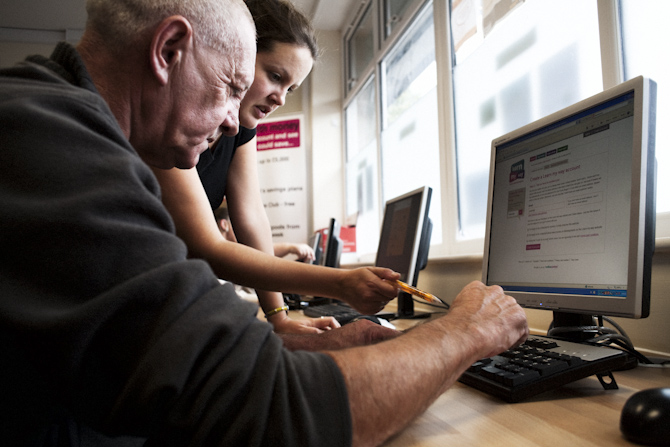
Another older man comes in as I’m talking to Paul and I overhear him tell Charlotte that he needs some help uploading his CV onto the Universal Jobmatch site. “That’s fine,” she says, “and it’s something I can help you with but I try and start everyone off with a little online course about finding their way around the keyboard. Are you okay if I set you off with that first?”
I haven’t taken my coat off and Vanessa has already introduced me to Cath, a freelance employment advisor.
“What do you do at the UCAN?” I ask her as a mug of tea is pushed into my hand.
“Whatever people need to do with employment and training,” she says. “If we hear that ten people are looking to get a store job in the run-up to Christmas then I’ll put on a little course on applying for retail jobs. That sort of thing.”
This UCAN prides itself on its responsive approach. Why offer apples when people want oranges, I had been told. There’s no point delivering services that no one needs.
Today is day three of a four-day course Cath is running to boost self-esteem and motivation. Before she can explain the ins and outs we’re interrupted by a knock on the door. The centre isn’t officially open for another 15 minutes.
“Can I use the phone?” asks a middle-aged man. “Vanessa said I could come early. I need to call them about my tax credits and make sure they’ve got my new address.”
Cath lets the man in and as soon as she sits down again there’s another knock on the door. It seems we’re not going to manage even the briefest of conversations. “I’ll pop up to your course later,” I say, “if that’s okay.”
Today it’s going to be busy. It’s money day and both Dawn from Money Skills and Steve from the Hoot credit union are in. And so is Jade from Think Positive, an ‘emotional wellbeing’ service. Vanessa introduces me to them all as the UCAN Centre starts to fill up with customers.
I’m feeling a little overwhelmed by it all and I take my tape recorder and camera and take refuge in Cath’s course in the upstairs meeting room.
Two men and four women are sitting round a table strewn with sweets and biscuits. Cath is asking about their perceptions of the Jobcentre. “You say it’s depressing as soon as you walk in, but what, specifically do they do to you?
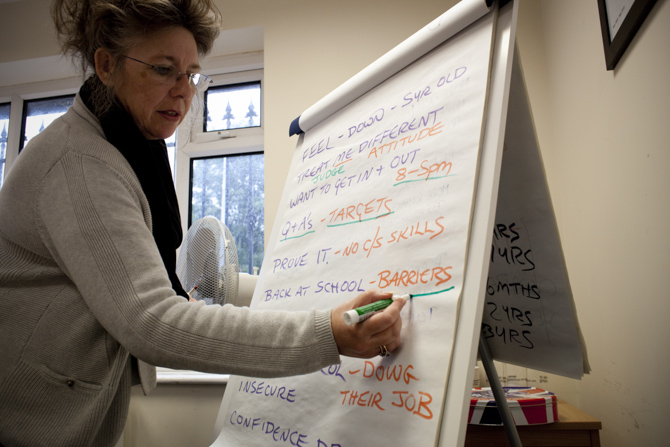
She is bombarded with negatives about people’s Jobcentre experiences and, pulling the top off a marker pen, has trouble writing them on her flip chart fast enough. “It’s horrible, I hate it… They ask you lots of questions: What jobs have you been looking for? Can you prove it?… It makes you feel like you’re back at school… You feel belittled…”
“As soon as you walk in that door your confidence just goes,” says one of the women. “You feel insecure.”
“You feel insecure, Morag? Isn’t it amazing how powerful this Jobcentre is? Look what it does to us,” says Cath, looking up from the flip chart.
“So let’s put ourselves in their shoes. We’re a Jobcentre advisor now. Do you think everyone walking towards their desk will have a gorgeous smile on their face?”
The participants, having enjoyed sharing what they hate about the JobCentre, are a little taken aback at having to see the situation from the other side. Everyone’s quiet as they try to imagine the scenario from the opposite angle. Cath suggests that the advisors will have targets and be under pressure to meet those targets.
“They still don’t have to talk to people the way they do,” says Morag. “They could talk to people nicely.”
“They must be like us though,” says a woman in a red top. “They must have good days and bad days.”
“What happens, do you think, when they leave the Jobcentre at the end of the day?” asks Cath.
“They forget about us,” says Morag.
“How do you know that?”
“I don’t. But that’s what I would do. I wouldn’t want to go home with my work.”
“But they’re not put in a cupboard to be recharged for the next day, are they?”
“They probably have pressures of their own,” says the woman in red, as the penny starts to drop.
“They are human beings like we are and they’ll have the same pressures: our bills, our debts, kids in trouble. Just because they are Jobcentre advisors doesn’t mean they’re not living every day like we are. And then they’ve got the likes of Mr Cameron telling them they’ve each got to get, say, 120 people into a job this month.”
“When there aren’t any,” someone says.
“When there aren’t any,” repeats Cath. “So, do you think they feel pressure? Of course they do. Even before they open the door to you guys.”
“And then we knock on the door,” laughs one of the men.
“Do you think they feel insecure? Is there a chance on it?” continues Cath. “With all that they have going on, do you think there’s a chance some of them might feel insecure?”
There are reluctant nods from around the room.
“So, what do you think would help your next visit to the Jobcentre? What could you do?”
“Smile,” someone says quietly as if breaking ranks.
“Walk towards them smiling,” repeats Cath.
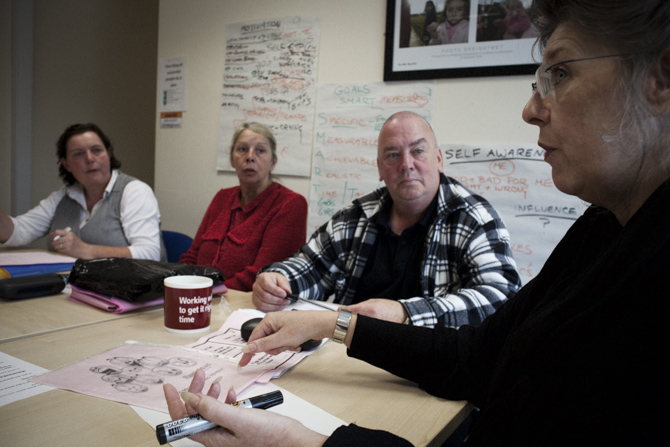
Ten minutes ago it would have been like throwing a hand grenade into the room if someone had suggested smiling at a JobCentre advisor but Cath has got them there – most of them anyway – and now the group realise that it’s their own attitude that affects the outcome of their Jobcentre experience.
“Won’t it get me into trouble though?” asks Morag.
“When was the last time anyone was imprisoned for smiling?” suggests Cath, with a big grin. “If you understand a bit more about them and have more self awareness about yourself then you can actually help to change their approach towards you.
“It’s about making it a win-win situation for you. And please don’t think the Jobcentre advisors are out to get you. They’re not. Change that perception. They have their limitations like we all do.
“And don’t expect them to do everything for you, because they can’t. Remember the UCAN has got experts to help you with a CV… we want you to have the best.”





